Mueller Ain’t Going Away
As much as Donald Trump wants the Russia probe headed by special counsel Robert Mueller to disappear, the investigation is gathering steam.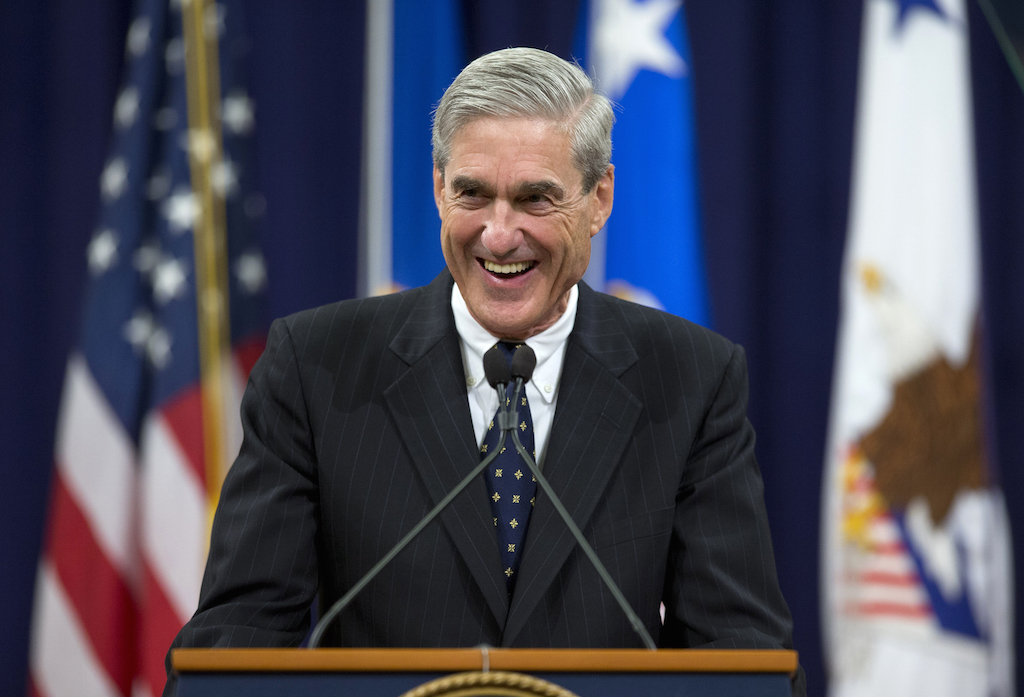 Robert Mueller. (Evan Vucci / AP)
Robert Mueller. (Evan Vucci / AP)
Among the many Twitter hashtags that have sprung up over the past year mocking Donald Trump, none is more cutting or insightful than one that appeared over the Thanksgiving weekend. Referring to Trump’s Make American Great Again (MAGA) campaign slogan and retweeted with varying punctuation, its essential message is: “MAGA=#MuellerAin’tGoingAway.”
I nearly choked with laughter when I spotted the subversive tweet on Black Friday. I quickly realized, however, that this wasn’t just another hilarious Twitter punch line. It was also a spot-on observation, politically and legally. Indeed, for the president, who spends hours on end tweeting diatribes against real and imaginary enemies, the hostile takeover of the MAGA mantra is the stuff of catastrophe.
As much as Trump may wish that the Russia investigation headed by special counsel Robert Mueller III would just fade away, and as hard as he huffs and puffs that there was no collusion with Russia during the campaign and that he’s the target of a McCarthy-style witch hunt conducted by the nefarious “deep state,” the investigation is gathering steam. It now threatens to engulf his presidency. According to several reports, White House staffers and aides are walking around in fear, asking one another daily with thinly disguised gallows humor if anyone inside the Oval Office might be wearing a wire.
For once, the president’s renowned paranoia is grounded in reality. Trump and his minions have good reason to be afraid—not because the president is the innocent victim of a vast neoliberal dragnet, but because Mueller’s work has moved from the investigation stage to the prosecution phase. Heads are starting to roll.
Late last month, former Trump campaign manager Paul Manafort and his business partner Rick Gates were indicted on 12 counts of violating federal law, including charges of conspiracy against the United States, money laundering, making false statements, and failure to register as foreign agents, stemming from their work as political consultants on behalf of the former government of Ukraine.
It also was disclosed in late October that former Trump campaign adviser George Papadopoulos had pleaded guilty to a single count of lying to the FBI about his knowledge of, and involvement with, Russian efforts to interfere with the 2016 election. Worse, court documents in Papadopoulos’ case indicate that he is now actively cooperating with Mueller.
Not surprisingly, Trump has sought to distance himself from the indictments and the guilty plea. Defiantly taking to Twitter immediately after the indictment was announced, he insisted that any unlawful behavior had occurred “years ago, before Paul Manafort was part of the Trump campaign.” Through his spokesperson, Sarah Huckabee Sanders, Trump branded Papadopoulos a liar. In an Oct. 31 news conference, Sanders also said that her boss expected the Mueller investigation to conclude soon.
It hasn’t, and it won’t.
While on the surface it might be plausible to denigrate Papadopoulos as a dishonest, publicity-seeking nobody, and to brush aside the Manafort/Gates prosecution as having nothing to do with the presidential race, both developments should be concerning to the president and his attorneys. They portend even bigger things to come. Mueller, it must be remembered, has a broad mandate not only to explore “any links and/or coordination between the Russian government and individuals associated with the campaign of President Donald Trump,” but also “any matters that arose or may arise directly from the investigation.”
As Fordham University Law School professor Jed Handelsman Shugerman has written in a series of articles for Slate, the Manafort/Gates indictment and the Papadopoulos plea appear to be part of a deliberate strategy of moving forward gradually on a relatively small number of a larger pool of potentially indictable offenses.
Other possible charges, in Shugerman’s estimation, are being held in reserve, both to ensure continued cooperation from Papadopoulos, and to ratchet up the pressure on Manafort and Gates to do the same in conjunction with the Russia probe. Shugerman also asserts that Mueller has held back on pursuing additional charges as a way of neutralizing Trump’s pardon power.
The Constitution (Article II, Section 2, Clause 1) vests the president with the power to grant reprieves and pardons for offenses against the United States, except in cases of impeachment. As the Supreme Court held in 1866, the power is virtually “unlimited.”
Still, presidential pardons affect only federal crimes, not state-level offenses. Under the “doctrine of dual sovereignty” that undergirds the American legal system, many crimes can be prosecuted in both federal and state courts.
It has long been surmised that Mueller is working in concert with New York Attorney General Eric Schneiderman on the Russia probe to construct a state case against Manafort and other Trump campaign officials should Trump elect to pardon anyone for federal offenses. Among the parallel state felonies Manafort and others in the Trump orbit might be charged with are tax, mortgage and loan fraud; obstruction of justice and witness tampering; money laundering; solicitation and conspiracy associated with the 2016 hack of the Democratic National Committee’s computers; and the illegal receipt of hacked emails.
New York’s financial fraud law, known as the Martin Act, dates back to 1921, and is considered the most formidable statute of its kind in the country. And it’s not just New York that would have jurisdiction over potential state-level, Trump-centered or Russia-related felonies. A conspiracy offense involving the use of computers or telephones, for example, could be prosecuted under the penal codes of multiple states, depending on such factors as where the phones and computers in question were located, where any illicit agreements were reached, or where the perpetrators or victims resided or ran their places of business.
Any state with a Democratic governor and attorney general thus could serve as a potential venue for such prosecutions. Think Virginia, where some Trump cronies reside or work, or Delaware, where some Trump organizations are incorporated. Even California, where Manafort and a relative purchased a home with a shady construction loan, according to the indictment, could be in the picture. State prosecutions, wherever they are initiated, also would survive any redux of Richard Nixon’s 1973 firing of Watergate special prosecutor Archibald Cox (the renowned Saturday Night Massacre) should Trump decide to dismiss Mueller in an effort to close down his operations.
If all this isn’t enough to keep the White House in a permanent condition of anxiety, the stories that broke last week that former national security adviser Michael Flynn has ended his “joint defense agreement” with Trump’s legal team certainly are.
A joint defense agreement is an arrangement that permits attorneys working for different defendants on the same side of a large, multiparty case to share confidential information that would otherwise be protected by the attorney-client privilege, or would expose the lawyers to conflicts of interest. It allows the attorneys to strategize collectively, and communicate freely and privately. Withdrawing from his joint defense agreement with Trump is a signal that Flynn either has or soon will reach a deal to cooperate with Mueller.
It’s easy to see why Flynn would want to cut a deal with the special counsel. He’s on the hook for lying to the FBI and Vice President Mike Pence about his meetings last December with then-Russian Ambassador Sergey Kislyak and for failing to register as a foreign agent for the Turkish government, for which he worked as a lobbyist out of his Virginia consulting business.
More recently, Flynn and his son, Michael Jr., have been linked to a Turkish plot to kidnap and rendition [deliver] exiled cleric Fethullah Gulen, an outspoken critic of President Tayyip Erdogan, from Pennsylvania to Turkey. The Flynns reportedly were offered a cool $15 million for their services. As with Manafort and Gates, any state where any aspect of the plot was discussed could host a prosecution against the Flynns.
Should Flynn flip, there is no reason to think Mueller will stop with him. Who, then, will be next?
Donald Trump Jr. and Jared Kushner immediately come to mind. Junior is vulnerable for organizing, and allegedly lying about, the June 9, 2016, Trump Tower meeting he convened with Russian lawyer Natalia Veselnikskaya to obtain damaging information on Hillary Clinton. He also secretly exchanged direct messages with WikiLeaks via Twitter during the waning months of the campaign.
Kushner faces potential jeopardy, among other acts and omissions, for repeatedly failing to disclose his contacts and communications with Russian government and financial personnel on his federal security clearance forms, including his interaction with Veselnikskaya at the Trump Tower confab. He also withheld emails sent to him during the campaign involving WikiLeaks in response to a document request served on him by the Senate Judiciary Committee.
But the biggest fish Flynn could help reel in for Mueller is the president himself, and not for collusion with Russia, but for obstruction of justice related to the May 10 firing of former FBI Director James Comey. In February, three months before he sent Comey packing, the president famously asked him to drop the FBI’s probe of Flynn for concealing his meetings with Kislyak. Mueller, no doubt, would love to secure Flynn’s cooperation and have him testify under oath about the president’s real motives for approaching Comey on his behalf.
There also can be no doubt that as Mueller closes in on Trump and his innermost circle, the president will retreat to Twitter to bark out his disapproval and rally his base against the special counsel. When and if he does, he will surely encounter the vexing hashtag #MuellerAin’tGoingAway.
Your support matters…Independent journalism is under threat and overshadowed by heavily funded mainstream media.
You can help level the playing field. Become a member.
Your tax-deductible contribution keeps us digging beneath the headlines to give you thought-provoking, investigative reporting and analysis that unearths what's really happening- without compromise.
Give today to support our courageous, independent journalists.
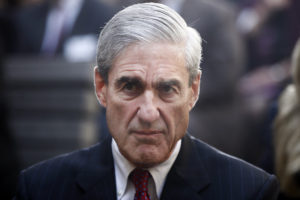
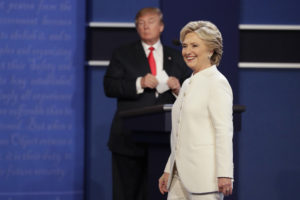
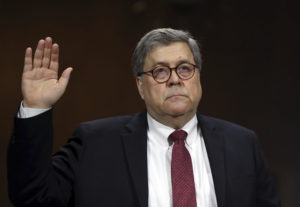
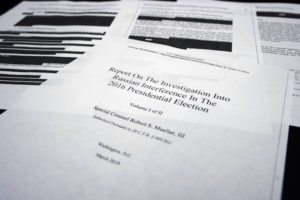
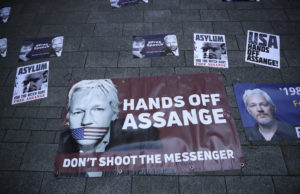

You need to be a supporter to comment.
There are currently no responses to this article.
Be the first to respond.